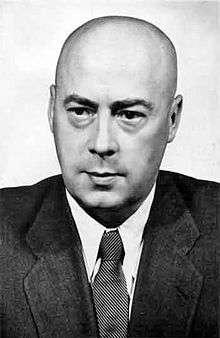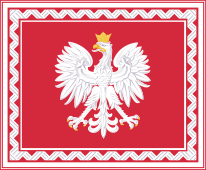Józef Cyrankiewicz
Józef Adam Zygmunt Cyrankiewicz [ˈjuzɛf t͡sɨranˈkʲɛvit͡ʂ] (![]()
Early life
Born in Tarnów in what was then the Austro-Hungarian Empire, Cyrankiewicz attended the Jagiellonian University. He became secretary of the Kraków branch of the Polish Socialist Party in 1935.
World War II
Active in the Union of Armed Struggle (Związek Walki Zbrojnej, later renamed to Armia Krajowa), the Polish resistance organisation, from the beginning of Poland's 1939 defeat at the start of World War II, Cyrankiewicz was captured by the Gestapo in the spring of 1941 and after imprisonment at Montelupich was sent to the Auschwitz concentration camp. He arrived on 4 September 1942, and received registration number 62,933.
While there, Communist propaganda claims he attempted to organise a resistance movement among the other imprisoned socialists and also worked on bringing the various international prisoners' groups together. This organisation then, apparently, struggled to alert the outside world about what was happening in the camp. Others claim he collaborated with the Gestapo and sold stolen Jewish possessions. These claims, however, come from right-wing publicists and are likely due to negative attitude towards his role as one of the leaders of Stalinist Poland. He, along with other Auschwitz prisoners, was eventually transferred to Mauthausen as the Soviet front line approached Auschwitz late in the war. He was eventually liberated by the US Army.
Rise to power
First period in office
Following the end of the war, he became secretary-general of the Polish Socialist Party's central executive committee in 1946. However, factional infighting split the Party into two camps: one led by Cyrankiewicz, the other by Edward Osóbka-Morawski, who was also prime minister.
Osóbka-Morawski thought the PSP should join with the other non-communist party in Poland, the Polish Peasant Party, to form a united front against communism. Cyrankiewicz argued that the PPS should support the communists (who held most of the posts in the government) in carrying through a socialist programme, while opposing the imposition of one party rule. The Communist Polish Workers' Party (PPR) played on this division within the PSP, dismissing Osóbka-Morawski and making Cyrankiewicz prime minister.
The PPS merged with the PPR in 1948 to form the Polish United Workers' Party (PZPR). Although the PZPR was the PPR under a new name, Cyrankiewicz remained as prime minister. He was also named a secretary of the PZPR Central Committee.
Implicated in Witold Pilecki's state murder
Although like Witold Pilecki Cyrankiewicz had been a concentration camp inmate during the war, their political and power differences played out after hostilities ended and he failed to intercede in the false conviction of war hero Pilecki. The show trial took place on 3 March 1948.[3] Pilecki was charged with illegal border crossing, use of forged documents, not enlisting with the military, carrying illegal arms, espionage for General Władysław Anders and espionage for "foreign imperialism" (British intelligence).[4] He was sentenced to death on 15 May with three of his comrades, and was executed with a shot to the back of the head at the Mokotów Prison in Warsaw on 25 May 1948 by Staff Sergeant Piotr Śmietański (nicknamed "The Butcher of Mokotow Prison" by the inmates).[5][6]In 1990 Witold Pilecki (and others convicted at the show trial) were rehabilitated.[7] Witold Pilecki was posthumously awarded the Order of the White Eagle in 2006, the highest Polish decoration.[8][9] On 6 September 2013, Pilecki was posthumously promoted to the rank of Colonel by the Minister of National Defence.[10]
Cyrankiewicz gave up the prime minister's post in 1952 because party boss Bolesław Bierut wanted the post for himself. He did, however, become a deputy premier under Bierut.
Second period in office
However, in 1954, after Poland returned to "collective leadership," Cyrankiewicz returned to the premiership, a post he would hold until 1970. By this time, there was little left of Cyrankiewicz the socialist, as evidenced during the 1956 upheaval following Nikita Khrushchev's "secret speech." He tried to repress the rioting that erupted across the country at first, threatening that "any provocateur or lunatic who raises his hand against the people's government may be sure that this hand will be chopped off."
Cyrankiewicz was also responsible for the order to fire on the protesters during the 1970 demonstrations on the coast in which 42 people were killed and more than a 1,000 wounded. A few months after these demonstrations, Cyrankiewicz went into semi-retirement and was named chairman of the Council of State—a post equivalent to that of a ceremonial president. He held this post until he retired in 1972.
Cyrankiewicz died in 1989, a few months before the collapse of the communist regime. However Cyrankiewicz (and others involved in the 1948 show trial) was posthumously charged in 2003 with complicity in Witold Pilecki's murder.
See also
- History of Poland (1945-1989)
- List of honorary citizens of Skopje
References
- Andrzej Krajewski (28 kwietnia 2011), Józef Cyrankiewicz, czyli jak kończą idealiści. Newsweek.pl. Archived December 9, 2012, at the Wayback Machine
- Jerzy Reuter (24 sierpnia 2009), Józef Cyrankiewicz. Tarnowski Kurier Kulturalny. Archived November 23, 2015, at the Wayback Machine
- The Times, 1948
- Tchorek 2009
- Piekarski 1990, p. 249
- Płużański, Tadeusz M. "Strzał w tył głowy." Publicystyka Antysocjalistycznego Mazowsza.
- Jack Fairweather (2019). The Volunteer:The true Story of the Resistance Hero Who infiltrated Auschwitz. London: WH Allen. ISBN 978-0753545164.
- Świerczek, Lidia. Pilecki's life. Institute of National Remembrance. Last accessed on 14 March 2009.
- (in Polish) "60 lat temu zginął rotmistrz Witold Pilecki" (Sixty years ago Captain Witold Pilecki died) Gazeta Wyborcza, PAP, 23 May 2008.
- "MON awansował Witolda Pileckiego" (in Polish). RMF FM/PAP. September 6, 2013. Retrieved October 10, 2013.
| Political offices | ||
|---|---|---|
| Preceded by Edward Osóbka-Morawski |
Prime Minister of Poland 1947–1952 |
Succeeded by Bolesław Bierut |
| Preceded by Bolesław Bierut |
Prime Minister of Poland 1954–1970 |
Succeeded by Piotr Jaroszewicz |
| Preceded by Marian Spychalski |
Chairman of the Polish Council of State 1970–1972 |
Succeeded by Henryk Jabłoński |

